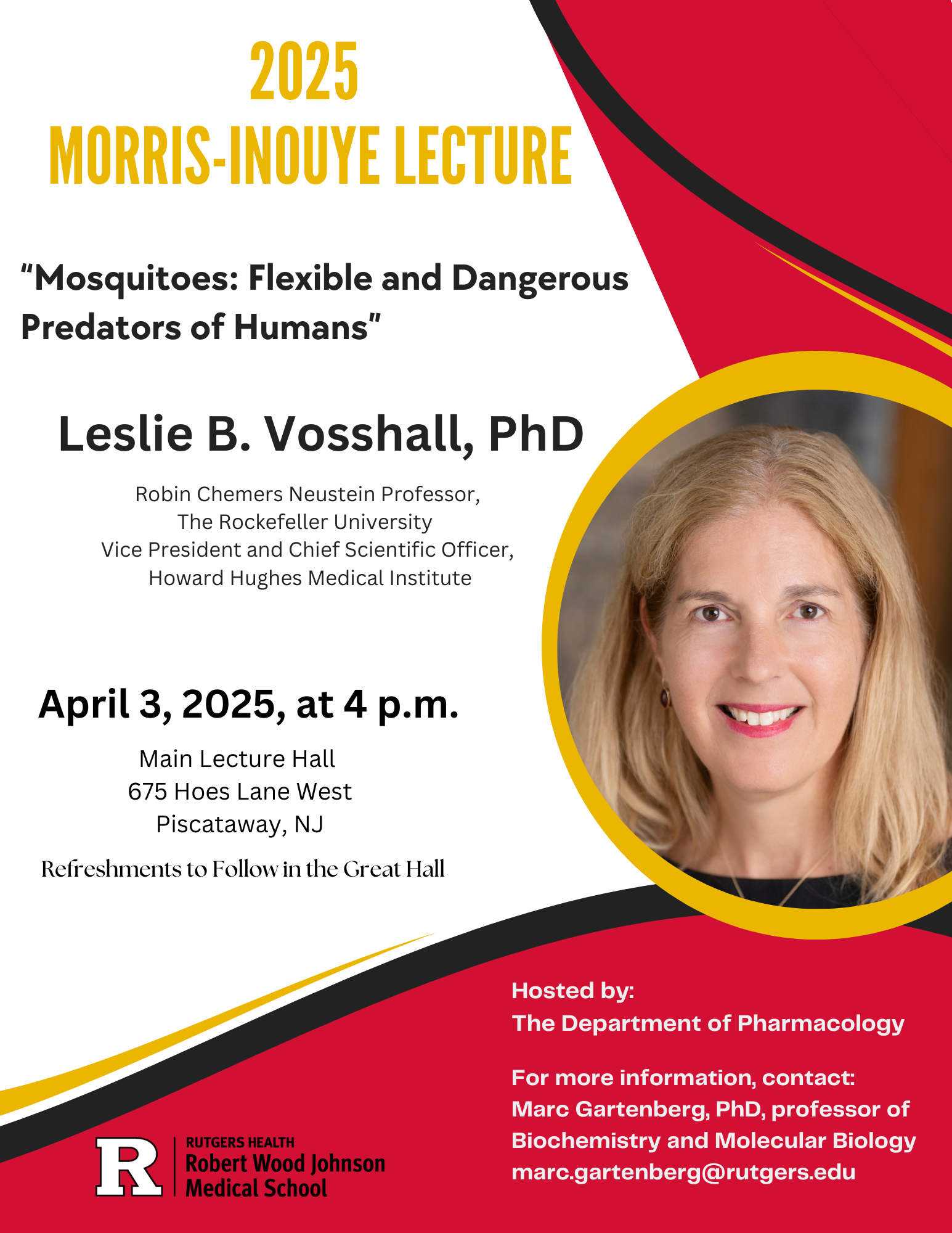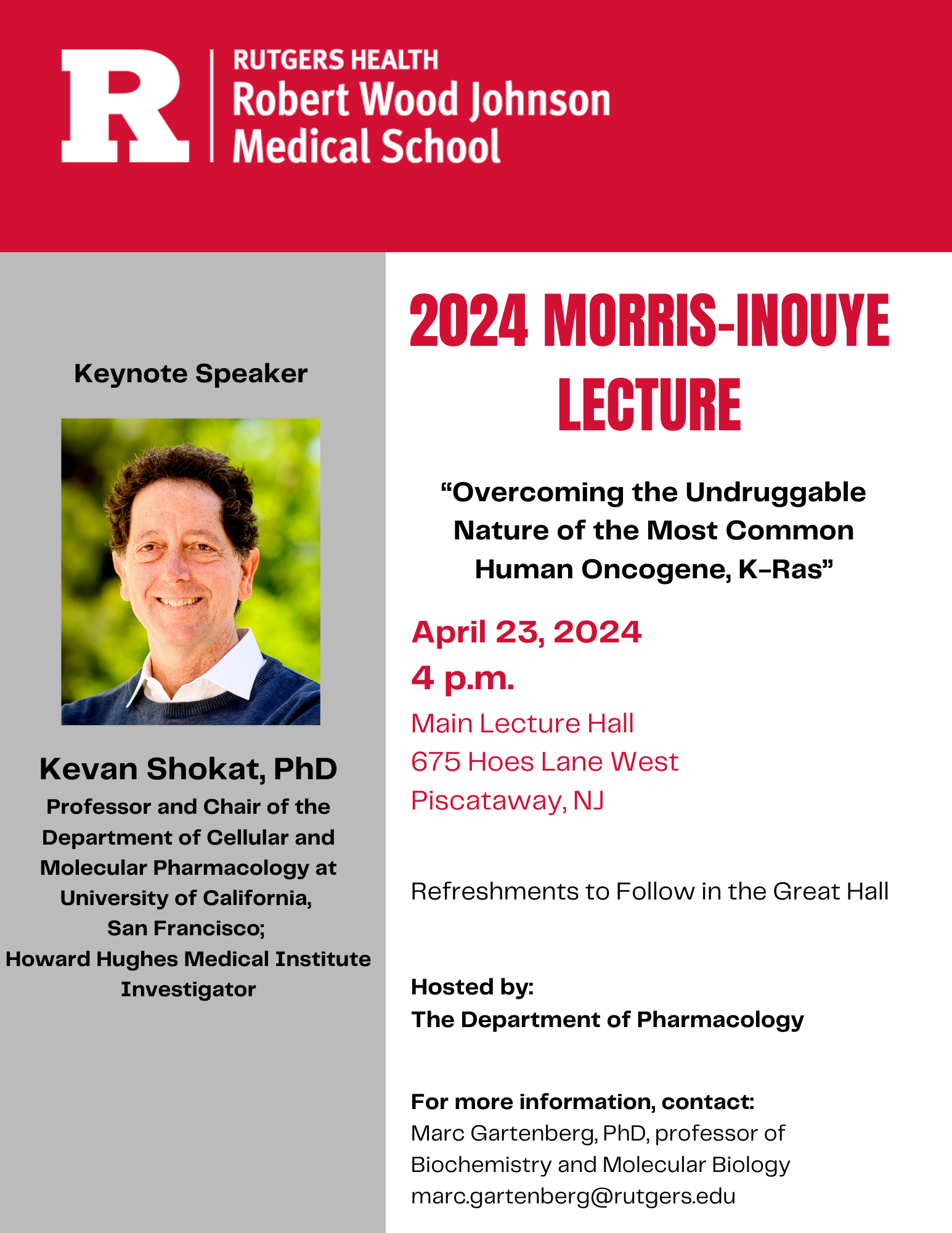2025 Morris-Inouye Lecture
Main Lecture Hall, Research Tower
675 Hoes Lane West
Piscataway, NJ 08854
675 Hoes Lane West
Piscataway, NJ 08854
Dr. Leslie Vosshall will deliver the 2025 Morris-Inouye Lecture at 4 PM on Thursday April 3rd in the Main Lecture Hall of Robert Wood Johnson Medical School in Piscataway. Her lecture is titled “Mosquitoes: Flexible and Dangerous Predators of Humans”. A reception will follow.
Dr. Vosshall studies how mosquitos choose humans for their meals, and which humans they like best. Her lab has identified neurobiological bases of host odor and CO2 perception, as well as egg-laying and the action of insect repellents. Her lectures are accessible and appeal to broad audiences.
Dr. Vosshall is the Robin Chemers Neustein Professor of Neurogenetics and Behavior at The Rockefeller University, as well as Vice President and Chief Scientific Officer of the Howard Hughes Medical Institute. She is a member of the National Academy of Sciences, the National Academy of Medicine, and a fellow of the American Academy of Arts and Sciences. She is also a recipient of numerous prestigious awards, including the 2024 Dickson Prize in Medicine.

Dr. Kevan Shokat will deliver the inaugural Morris-Inouye Lecture at 4 PM on April 23rd in the Main Lecture Hall of Robert Wood Johnson Medical School in Piscataway. His lecture is titled “Overcoming the Undruggable Nature of the Most Common Human Oncogene, K-Ras”. A reception will be held in the Great Hall will follow.
Dr. Shokat’s research focuses on the discovery of small molecule tools and drug candidates that target kinases, GTPases, and helicases. His laboratory utilizes the tools of synthetic organic chemistry, protein engineering, structural biology, biochemistry, and cell biology.
Dr. Shokat is currently an Investigator of the Howard Hughes Medical Institute, Professor in the Department of Cellular and Molecular Pharmacology at the UCSF and Professor in the Department of Chemistry at the UC Berkeley. He is the recipient of numerous prestigious awards and a member of the National Academy of Sciences, the National Academy of Medicine, and the American Academy of Arts and Sciences.

Graduate students and postdoctoral fellows will learn about constructing an NIH fellowship application. This is also a very valuable workshop for graduate students who are writing their thesis proposals.
March 3 from 12-1:30pm
This session will be held in-person in Piscataway at EOSHI and New Brunswick at CINJ. Lunch will be served at both locations. Others can participate via Zoom.
There will also be a second optional session on March 16 from 12-1:30pm for those who want to receive feedback on their Specific Aims pages.
This workshops is sponsored by School of Graduate Studies-BHS, Office of Postdoctoral Advancement and NJ ACTS
Learn ways to advance your career through opportunities at Rutgers Innovation Ventures. Their mission is to partner with the Rutgers community to encourage deliberate innovation, protect and leverage Rutgers intellectual property, foster collaboration with industry, and enable entrepreneurship. There are two opportunities for grad students and postdocs:
• Effectively protect and commercialize the results of scientific research.
• Evaluate an Invention Disclosure, prepare Non‐Confidential Summaries, and identify and reach out to prospective licensees.
• Negotiate the business terms of various agreements that govern Technology Transfer in an academic institution.
June 2 from 3-4:30pm
Click here to see speakers information.
This virtual workshop will use techniques and case studies from the National Research Mentoring Network (NRMN) to teach PhD students and Postdoctoral Fellows tools and skills to better mentor undergraduate students in a laboratory setting.
Attendees will also reflect upon approaches they would use to mentor trainees and employees when
they are running a lab or research group in the future.
Follow up activities will be suggested for those who wish to get more engaged in this process.
Click here to see slides.
This workshop covers the basics of converting your highly complex project ideas into a compelling story. The focus is on the creation of a flawless "Specific Aims" page as the foundation of any well-engineered grant. This workshop will be useful for those writing Pre-doctoral fellowships as well as their Propositional Qualifying Exams
Click here to see slides.
This event is part of the Language and Social Justice Initiative Speaker Series hosted by The Language Center at the Rutgers School of Arts and Sciences.
LINGUISTIC INEQUALITY IN HIGHER EDUCATION: Solving the Problem We Created
Dr. Walt Wolfram
William C. Friday Distinguished University Professor at North Carolina State University
March 4, 3:00-4:30pm ET
RU-NB CAC - Location TBD (in-person event)
Notwithstanding the avowed commitment of higher education to equality and inclusion, the issue of language has been excluded from or erased in diversity programs at most universities. This presentation empirically documents the basis of linguistic prejudice and discrimination in higher education through an extensive series of student and faculty interviews in a large metropolitan university. Based on the conclusions, we developed an innovative, campus-infusion model for language diversity targeting students, faculty, and staff at the university. Activities include integrated classroom materials, videos highlighting linguistic diversity on campus, formal and informal workshops for diverse campus populations, the establishment of a university-ratified Linguistic Diversity Student Ambassadors program, and other activities and resources that have led to the creation of a national model for authentically including language in the diversity canon in higher education.
Walt Wolfram is William C. Friday Distinguished University Professor at North Carolina State University, where he also directs the Language and Life Project at North Carolina State University. He has pioneered research on social and ethnic dialects since the 1960s and published 23 books and over 300 articles. Wolfram’s current focus is on the application of sociolinguistic information to the public, including the production of 14 television documentaries (three Emmy Awards), the construction of museum exhibits, and the development of innovative formal and informal materials related to language diversity. He is the recipient of numerous awards, including the North Carolina Award (the highest award given to a citizen of North Carolina), Caldwell Humanities Laureate from the NC Humanities Council, the Board of Governor’s Holshouser Award for Excellence in Public Service, and is a fellow of the prestigious American Academy of Arts & Sciences.
This event is part of the Language and Social Justice Initiative Speaker Series hosted by The Language Center at the Rutgers School of Arts and Sciences.
THE IMPLICATIONS OF SOUNDING LIKE A STEREOTYPE: Cognition and African American English
Dr. Rachel Elizabeth Weissler
Postdoctoral Research Fellow Psychology, Linguistics, and Black Studies at College of Arts and Sciences, University of Oregon
February 9, 5:00-6:30pm ET (Virtual Event)
This research investigates the relationship between perception of race and perception of emotion by operationalizing the Angry Black Woman Trope through survey and eye-tracking methods. In the first study, participants listened to isolated words from an African American English (AAE) speaker and a Standardized American English (SdAE) speaker in happy, neutral, and angry prosodies, and were asked to indicate perceived race and emotion of the speaker. Results showed that SdAE was rated whitest in the happy condition, whereas AAE was rated blackest in neutral and angry conditions. In the second study, participant experiential linguistic knowledge was measured. It was hypothesized that listeners with higher experiential linguistic knowledge of AAE would show less bias, determined by identifying emotional speech with emotional and racialized image stimuli as recorded through the virtual eye-tracker. The results indicate that participants have a broad range of experiential linguistic knowledge with AAE, and trends in the data suggest that higher usage can predict less bias.
Rachel is a postdoctoral scholar in Psychology, Linguistics, and Black Studies in the College of Arts and Sciences at the University of Oregon. Her research focuses on the linguistic multidimensionality of individuals, and how different intersecting identities, communities, and environments influence perception and processing of standardized and minoritized language varieties. She uses theories and methodologies from sociolinguistics, neurolinguistics, and psycholinguistics to investigate how American English-speaking listeners cognitively interact with Black and white individuals. She also engages in multiple public linguistics efforts, most consistently through her role as Production Assistant for A Way With Words Radio Show and Podcast.
• Janet Alder and Jim Millonig from the School of Graduate Studies will present a new document from the AAMC on Appropriate Treatment of Research Trainees for faculty to learn about best practices in mentoring
• This will be followed by an interactive session run by CAPS counselors for faculty to learn about approaches and resources for dealing with students in distress.
• Finally we will discuss a case study and share experiences and advice in mentoring biomedical PhD students
Learn best practices in experimental design, manuscript preparation, and submission to help you get your papers published.